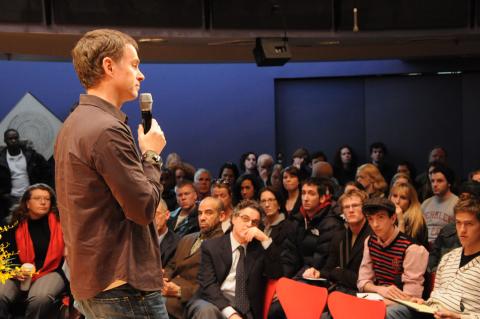The Future of the Music Business: Smart Phones

Terry McBride, CEO of Nettwerk Music Group addressed a group of students and faculty at the college on February 20.
Phil Farnsworth
Terry McBride doesn’t believe all the doom and gloom pronounced by the big record companies these days. And he doesn’t consider it depressing that 95 percent of digital music is now listened to for free; he considers it an opportunity.
McBride is the CEO of Nettwerk Music Group, the record label for such artists as Sarah McLachlan, Coldplay, and k-os. He sees the future of the music business not in downloads, but in metadata and smart-phone applications. During his Zafris Distinguished Lecture for Music/Business Management on February 20, McBride shared some of these insights. McBride is the 16th guest lecturer in the series named for Berklee trustee emeritus James G. Zafris.
According to McBride, the secret is not to try to force people to buy your song when they can find it in a hundred other places for free. “Suing consumers just created new technologies that couldn’t be tracked,” McBride said. “How do you sue millions of people? You can’t.”
Instead, McBride said, the goal should be to make your song easier to access and more valuable than anything consumers can get for free. McBride envisions a slew of metadata added to each file that won’t just make a song more searchable but would include many different versions of the song: a karaoke version, a clean version, a fan mix, etc. Nettwerk tries to add such value to the music it releases, but McBride believes that fans in the music community will ultimately take on this role by adding what they want to hear.
Soon consumers will access this information on their smart phones, McBride says. Since the iPhone App Store opened nine months ago, more than 500 million applications have been downloaded. And with consumers replacing cell phones every two years, McBride believes that the market for smart phone–related products is poised to take off even more dramatically. Record companies need to be part of that action.
McBride points to the music-identifying application Shazam as an example of what the music business should pursue. When you expose your iPhone to a song that’s playing, Shazam identifies the song and provides a link to iTunes, where you can buy the track immediately.
McBride envisions other music applications, such as a virtual valet that finds new music for you and “parks” it where you want it, a virtual maid to clean up and sort all the music files on your computer, and concert tickets that appear as just a bar code on your phone.
McBride considers these programs social media rather than music applications. He emphasized that ultimately it’s not technology that makes artists successful in the music business; it’s the connection they make with listeners.
In his address, McBride also discussed record companies aligning with causes that artists support, the clothing they wear, and so on to market the entire experience. But he cautioned that sincere interest can’t be faked. Companies must ensure that the process is an “alignment of authentic causes.”
Because today’s consumers mistrust advertising, money spent on grass-roots outreach methods is often more effective. McBride notes that peer-to-peer mechanisms have always been the best method for reaching people.
“Neither Radiohead or U2 broke with their first album; they broke on their third,” he said. “Consumers found it by grass-roots communication. A band’s success is based on their ability to get consumers to advertise for them.”
And while the big record companies might be sweating, McBride doesn’t think the music business has anything to worry about. “The authentic [experience] of a live performance cannot be duplicated,” he said. “It becomes an emotional bookmark.”




